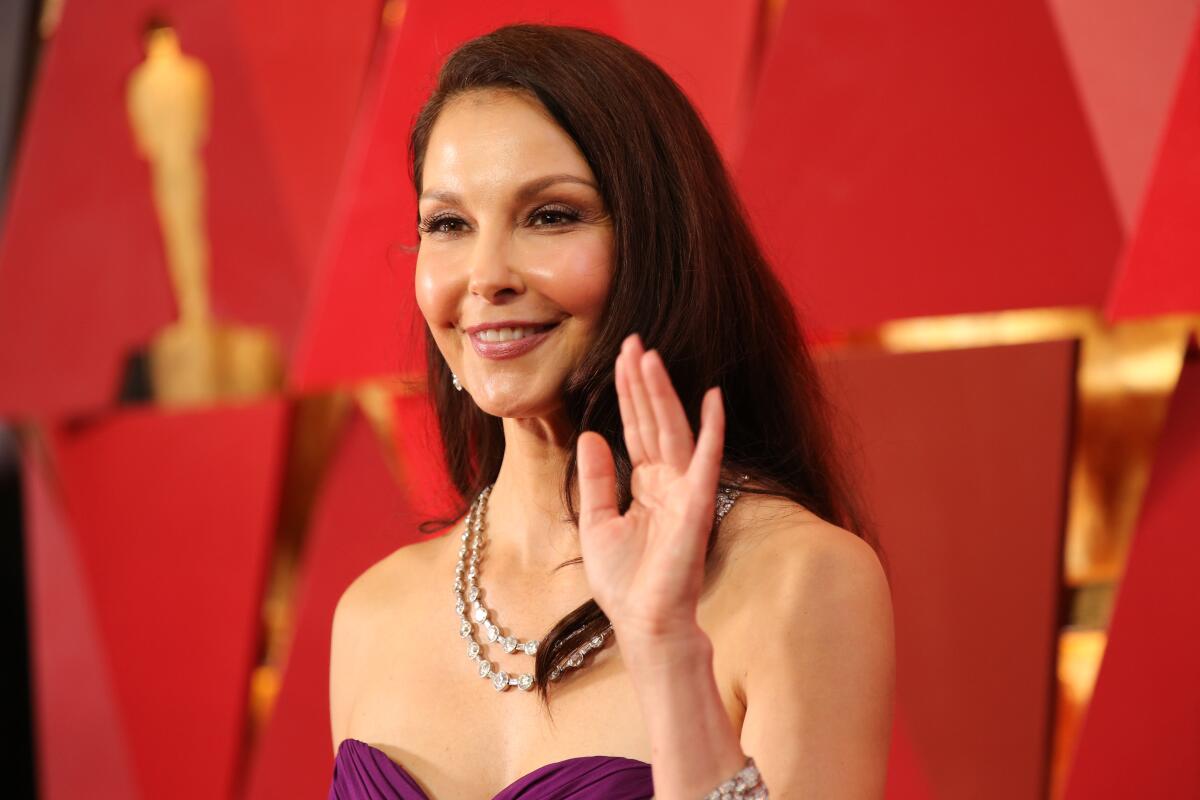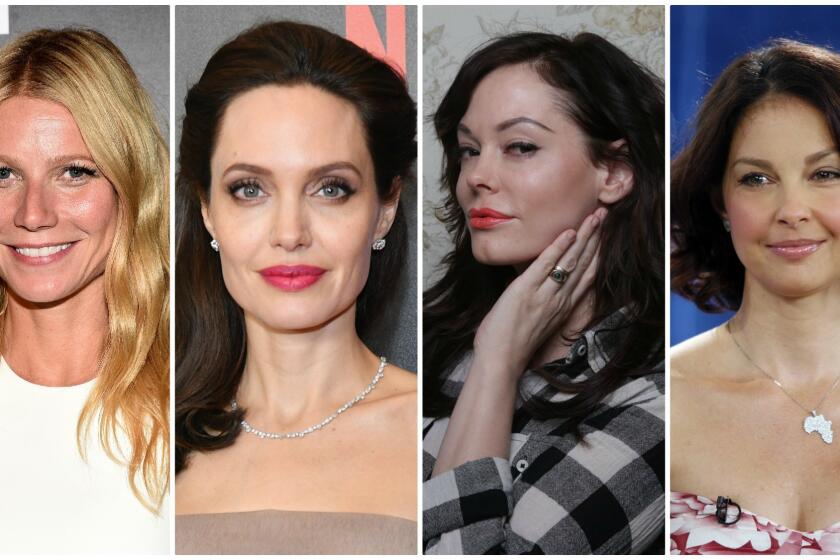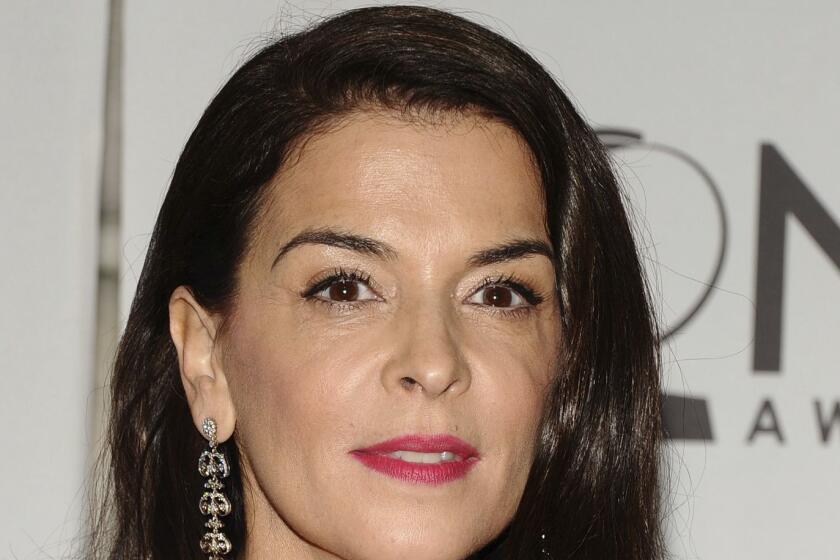How the N.Y. Times got Ashley Judd and other Weinstein victims to talk

- Share via
How do you persuade A-list actresses like Ashley Judd and Gwyneth Paltrow to take down one of Hollywood’s biggest producers? That’s exactly what New York Times reporters Jodi Kantor and Megan Twohey explain in “She Said,” their new book about the Harvey Weinstein investigation.
“We wanted to illuminate the experiences of these brave women, like Ashley Judd, the back stories of how it was that they stepped up and went on the record, the gut-wrenching decisions they faced behind the scenes,” Twohey said Monday on NBC’s “Today” show. “We also wanted to talk about the machinery that was in place to silence those women and block this investigation.”

Judd, who accused the producer of sexual harassment, joined the Pulitzer Prize-winning reporters on Monday ahead of the launch of their book, which hits shelves on Tuesday. (The women were later accompanied by Rowena Chiu, a Weinstein accuser who broke a nondisclosure agreement Monday when she alleged that the producer tried to rape her.)
Judd explained how she got involved in the investigation and why she agreed to be a named source in Kantor and Twohey’s articles, which were first published in October 2017.
“I’m good with the God of my understanding and I’ve been good with Harvey Weinstein for a long time because I know what he did to me, and I know what he did to a lot of my colleagues, and I was unafraid of him, and I was very comfortable with the power of these two and their investigative reporting and the power of the New York Times,” Judd said. “It’s a venerable institution, and their legal team had vetted their reporting and I knew that it was all going to be OK.”
“It was time,” she added.
In “She Said: Breaking the Sexual Harassment Story That Helped Ignite a Movement,” Kantor and Twohey recount how they persuaded the women and Weinstein Co. employees to come forward for their New York Times investigation.
“We recount the very first tentative conversations, fruitless searches for contacts and final confrontations with Weinstein on the phone,” Kantor said.

Harvey Weinstein’s accusers: Full list includes fledgling actresses and Hollywood royalty
The groundbreaking story, its sister piece in the New Yorker and follow-up articles delineated Weinstein’s alleged pattern of behavior and the legal settlements that perpetuated the alleged misconduct. But it was just the tip of the iceberg. The reporting launched the far-reaching #MeToo and Time’s Up movements, several criminal investigations into Weinstein (and several other powerful men) and led to the downfall of the once-untouchable Hollywood mogul.
Weinstein, who now has more than 80 accusers, is set to go to trial in January. The producer has vehemently denied allegations of assault and non-consensual sex.
Kantor said that “everybody was scared to go on the record” and that at one point in their reporting, only a former Weinstein assistant was willing to be named, but no actresses. They talk about that in “She Said,” which explores how the story was not just about the individual predator but also those who were complicit, abuses of power and and the machinery in place to silence women like Judd.
As for how they earned the women’s trust, Kantor said: “We said to victims, ‘Look, we can’t change what happened to you in the past, but if we work together we may be able to take this in some sort of constructive direction.’”
Judd was aware that the women, whose allegations dated back to the early 1990s, wanted company in coming forward. She took a day to think about Kantor and Twohey’s request that she be a named source in the newspaper’s investigation and when she finally agreed, “at that moment, Ashley ended a silence that had held in Hollywood for so many years,” Kantor said.
“You know, we have this wonderful gathering that is documented in the book where Jodi and Megan were able to bring all of us women together,” Judd said. “And that’s part of how sexual harassment works — predators separate and isolate women from each other, and we think our narratives are unique and that we are — we suffer and are separated, but it brought all of us together, including some unexpected allies.”
The Manhattan district attorney’s office recently launched an effort to add to a formal criminal allegation from “Sopranos” actress Annabella Sciorra.
The gathering took place at the home of Oscar winner Paltrow, arguably one of Weinstein’s biggest stars, who facilitated much of Kantor and Twohey’s reporting behind the scenes.
“I was able to say to Gwyneth, ‘I always worried about you’… and Gwyneth was able to say to me, ‘I was cheering for you, I knew that you were going to be the one to tell the story,’ and I’m so glad I did,” Judd said. “I also went out in nature when I was considering telling, being the named source, and I just thought, ‘I have already made tough decisions in my life, and I like to do the harder thing, and this is relatively easy.’ I’ve been telling the story, actually, for many years. Now it’s just time to do so with the power of the New York Times behind me.”
Much of the discussion shifted to Paltrow, who had her own confrontation with Weinstein that involved then-boyfriend Brad Pitt. NBC ran a statement from Weinstein on Monday that refuted her narrative in the book and said it was “one-sided.”
But the reporters and Judd said Paltrow changed the course of the investigation, even though she didn’t go on the record in the first article, because she was determined to help.
“I think that many people will be surprised to discover that when so many other actresses were reluctant to get on the phone and scared to tell the truth about what they had experienced at his hands, that Gwyneth was actually one of the first people to get on the phone and that she was determined to help this investigation, even when Harvey Weinstein showed up to a party at her house early and she was sort of forced to hide in the bathroom,” Twohey said.
“I think Harvey Weinstein was extremely aware and extremely scared of what the implications would be if his biggest star actually ended up going on the record,” Twohey added.
More to Read
The complete guide to home viewing
Get Screen Gab for everything about the TV shows and streaming movies everyone’s talking about.
You may occasionally receive promotional content from the Los Angeles Times.








